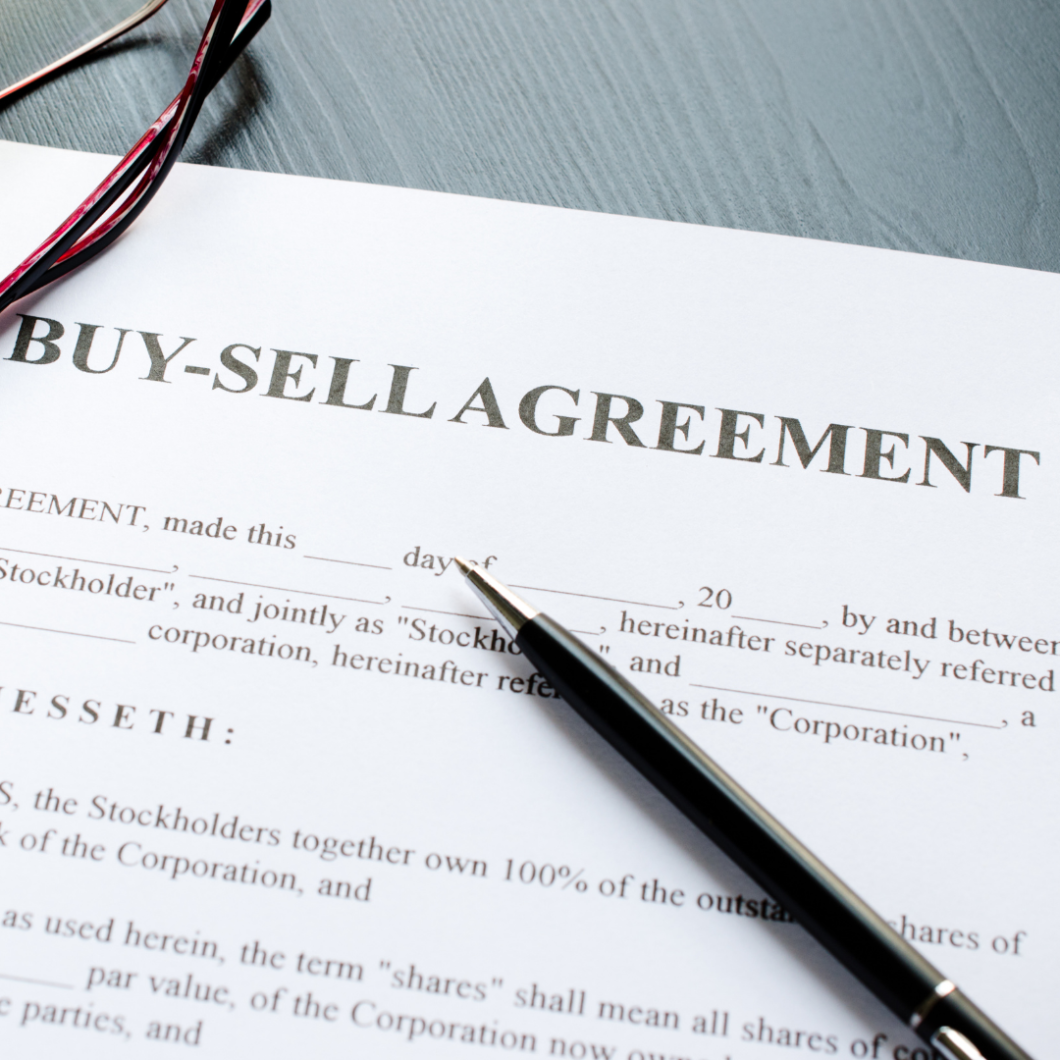
If you are a business owner, you probably worry about your bottom line, employee retention, and health insurance premiums, but have you also considered what will happen to your business if you are in an accident? What if your business partner gets divorced and your partner’s ex-spouse is awarded part ownership of the business and wants to make decisions affecting it? Every business should lay out a plan for what will happen if certain events occur to its owners—death, divorce, incapacity, retirement, or the sale of the owner’s interest to another person. Unfortunately, most business owners do not have a business succession plan in place to address these events, risking substantial harm to the business.
A buy-sell agreement is a crucial part of a business succession plan. A buy-sell agreement is a binding agreement between business owners that sets out what will happen to the business if certain triggering events occur. Here are seven things you should consider before entering into a buy-sell agreement for your business:
- It is never too early to create a buy-sell agreement. Buy-sell agreements should be discussed as soon as business owners decide to form a business. When the business is first formed, the owners may work with a lawyer to create customer contracts and bylaws or a business operating agreement. This is the perfect time to discuss some of the more challenging issues. In the beginning, when everyone is excited about the business, co-owners should talk about what should happen if one of the owners cannot (or does not want to) continue in the business. It is important to address these issues early, while the owners can remain objective, rather than waiting until they are wrapped in emotion or angst after a triggering event.
- Identify and address triggering events. Discuss possible scenarios with your partners. What will happen in the event of an accident or the death of one of the partners? What if an owner gets divorced—will the partner’s ex-spouse attempt to exert control? The partners should also consider other common scenarios, for example, what should happen when one of the owners wants to retire, leave the business, start a new business, or even file for personal bankruptcy. How can the business owners prevent these events from disrupting the business’s day-to-day operations or devaluing the business? The buy-sell agreement should address each of these triggering events.
- Establish a valuation method. When an owner wants to leave the business, the owners may use different methods to value the business, resulting in different opinions regarding the amount the departing owner should receive. Establishing the valuation method in the buy-sell agreement allows the owners to agree on how to value the business in advance. This reduces conflict because the owners have already agreed on the method for calculating a reasonable price for the shares. The valuation method will depend on the type of business. For example, a business with real estate holdings may use real estate appraisals to determine asset value, whereas a business with more complicated assets may need to use a market-based, income-based, or total-asset approach.
- Determine funding methods for the buyout. It is important to discuss not only how price is determined, but also who can and cannot be a buyer and how the sale will be funded. The agreement should specify methods the buyer can use to fund a buyout of the departing owner if a triggering event occurs. Will the buyer have enough cash, or will loans be needed? Should the business owners purchase life or disability insurance policies to fund the buyout? Will the owners allow an installment agreement for a purchase of shares? Funding is the key to enabling a member to smoothly exit a business.
- Structure the buyout. There are several ways to structure a buy-sell agreement. The most common structure involves creating an agreement for the remaining business owners to purchase the shares of the departing owner. Other buy-sell agreements may have terms providing for a repurchase of the exiting member’s shares by the company itself or the sale of the departing member’s shares to another person who is not currently an owner of the business. Some buy-sell agreements are a hybrid of these approaches.
- Remove emotion. A big incentive for entering into a buy-sell agreement early is the ability to remove emotion from the equation when an event such as a disagreement, death, divorce, or incapacity occurs, leading an owner to pursue a sale of the owner’s interest. If the owners are able to rationally discuss possible scenarios and exit strategies before an emotional triggering event occurs, they can refer to the agreement itself and focus on the company’s best interests rather than on their own self-interest when it does occur.
- Consult the experts. As with most business decisions, owners who wish to enter into a buy-sell agreement should consult both tax advisors and business lawyers. A sale of an owner’s shares or repurchase by the business can be structured to minimize taxes. It is recommended that business owners discuss the valuation and buyout plans with their tax advisor. Business owners should also consult with a business lawyer to determine the optimal buy-out strategies and create a legally binding agreement.
We Can Help
A buy-sell agreement should be among every business’s foundational documents. While creating a properly structured buy-sell agreement involves numerous considerations, the key provisions should address triggering events, valuation, buyout method, and how the buyout will be funded. A buy-sell agreement will help ensure that your business can withstand the inevitable twists and turns ahead. Call us today to set up an appointment if you need assistance with a buy-sell agreement or other important documents for your business.
